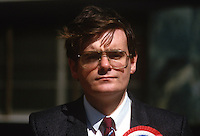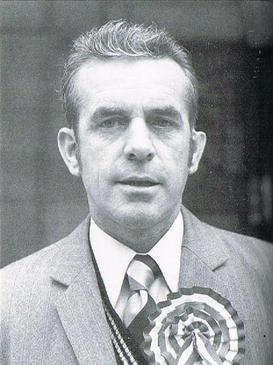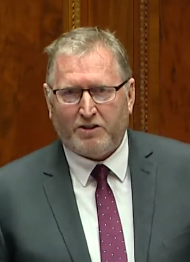Related Research Articles

The Ulster Unionist Party (UUP) is a unionist political party in Northern Ireland. The party was founded as the Ulster Unionist Council in 1905, emerging from the Irish Unionist Alliance in Ulster. Under Edward Carson, it led unionist opposition to the Irish Home Rule movement. Following the partition of Ireland, it was the governing party of Northern Ireland between 1921 and 1972. It was supported by most unionist voters throughout the conflict known as the Troubles, during which time it was often referred to as the Official Unionist Party (OUP).

The Ulster Volunteer Force (UVF) is an Ulster loyalist paramilitary group based in Northern Ireland. Formed in 1965, it first emerged in 1966. Its first leader was Gusty Spence, a former Royal Ulster Rifles soldier from Northern Ireland. The group undertook an armed campaign of almost thirty years during The Troubles. It declared a ceasefire in 1994 and officially ended its campaign in 2007, although some of its members have continued to engage in violence and criminal activities. The group is a proscribed organisation and is on the terrorist organisation list of the United Kingdom.

The Democratic Unionist Party (DUP) is a unionist, loyalist, British nationalist and national conservative political party in Northern Ireland. It was founded in 1971 during the Troubles by Ian Paisley, who led the party for the next 37 years. It is currently led by Gavin Robinson, who initially stepped in as an interim after the resignation of Jeffrey Donaldson. It is the second-largest party in the Northern Ireland Assembly, and won five seats in the House of Commons of the United Kingdom at the 2024 election. The party has been mostly described as right-wing and socially conservative, being anti-abortion and opposing same-sex marriage. The DUP sees itself as defending Britishness and Ulster Protestant culture against Irish nationalism and republicanism. It is also Eurosceptic and supported Brexit.
The Progressive Unionist Party (PUP) is a minor unionist political party in Northern Ireland. It was formed from the Independent Unionist Group operating in the Shankill area of Belfast, becoming the PUP in 1979. Linked to the Ulster Volunteer Force (UVF) and Red Hand Commando (RHC), for a time it described itself as "the only left of centre unionist party" in Northern Ireland, with its main support base in the loyalist working class communities of Belfast.

Peter David Robinson is a retired Northern Irish politician who served as First Minister of Northern Ireland from 2008 until 2016 and Leader of the Democratic Unionist Party (DUP) from 2008 until 2015. Until his retirement in 2016, Robinson was involved in Northern Irish politics for over 40 years, being a founding member of the DUP along with Ian Paisley.

The Anglo-Irish Agreement was a 1985 treaty between the United Kingdom and the Republic of Ireland which aimed to help bring an end to the Troubles in Northern Ireland. The treaty gave the Irish government an advisory role in Northern Ireland's government while confirming that there would be no change in the constitutional position of Northern Ireland unless a majority of its citizens agreed to join the Republic. It also set out conditions for the establishment of a devolved consensus government in the region.

David Ervine was a Northern Irish Ulster Loyalist and politician who served as leader of the Progressive Unionist Party (PUP) from 2002 to 2007 and was also a Member of the Northern Ireland Assembly (MLA) for Belfast East from 1998 to 2007. During his youth Ervine was a member of the Ulster Volunteer Force (UVF) and was imprisoned for possessing bomb-making equipment. Whilst in jail he became convinced of the benefits of a more political approach for loyalism and became involved with the PUP. As a leading PUP figure, Ervine helped to deliver the loyalist ceasefire of 1994.

Ulster loyalism is a strand of Ulster unionism associated with working class Ulster Protestants in Northern Ireland. Like other unionists, loyalists support the continued existence of Northern Ireland within the United Kingdom, and oppose a united Ireland independent of the UK. Unlike other strands of unionism, loyalism has been described as an ethnic nationalism of Ulster Protestants and "a variation of British nationalism". Loyalists are often said to have a conditional loyalty to the British state so long as it defends their interests. They see themselves as loyal primarily to the Protestant British monarchy rather than to British governments and institutions, while Garret FitzGerald argued they are loyal to 'Ulster' over 'the Union'. A small minority of loyalists have called for an independent Ulster Protestant state, believing they cannot rely on British governments to support them. The term 'loyalism' is usually associated with paramilitarism.

George Seawright was a Scottish-born unionist politician in Northern Ireland and loyalist paramilitary in the Ulster Volunteer Force. He was assassinated by the Irish People's Liberation Organisation in 1987.

Ulster Resistance (UR), or the Ulster Resistance Movement (URM), is an Ulster loyalist paramilitary movement established by the Democratic Unionist Party (DUP) in Northern Ireland in November 1986 in opposition to the Anglo-Irish Agreement.

David McNarry is a former Northern Irish unionist politician and Ulster Loyalist representative who served as a Member of the Legislative Assembly (MLA) for Strangford from 2003 to 2016.
Robert David Stewart Campbell, CBE, usually known as David Campbell, is a Northern Irish unionist politician, Ulster Loyalist activist, farmer and businessman. He was a member of the 1996–1998 Northern Ireland Forum, and Chairman of the Ulster Unionist Party from 2005 to 2012.

Kenneth Gibson was a Northern Irish politician who was the Chairman of the Volunteer Political Party (VPP), which he had helped to form in 1974. He also served as a spokesman and Chief of Staff of the loyalist paramilitary organisation, the Ulster Volunteer Force (UVF).
Winston Churchill Rea, known as Winkie Rea, was a Northern Irish loyalist from Belfast. He was the leader of the Red Hand Commando (RHC), a paramilitary organisation that was active during the Troubles. Part of a leading loyalist family, Rea was involved in paramilitary activity from the early years of that conflict.
William Elliot was a former Northern Irish loyalist who served as brigadier of the Ulster Defence Association's (UDA) East Belfast Brigade in the 1980s.

Richard Jameson, was a Northern Irish businessman and loyalist, who served as the leader of the paramilitary Ulster Volunteer Force's (UVF) Mid-Ulster Brigade. He was killed outside his Portadown home during a feud with the rival Loyalist Volunteer Force (LVF), the breakaway organisation founded by former Mid-Ulster UVF commander Billy Wright after he and the Portadown unit of the Mid-Ulster Brigade were officially stood down by the Brigade Staff in August 1996.

On 3 December 2012, Belfast City Council voted to limit the days that the Union Flag flies from Belfast City Hall. Since 1906, the flag had been flown every day of the year. This was reduced to 18 specific days a year, the minimum requirement for UK government buildings. The move to limit the number of days was backed by the council's Irish nationalists while the Alliance Party abstained from the vote; it was opposed by the unionist councillors.
Jamie Bryson is a Northern Irish loyalist activist who originally attracted media attention as a leading figure in the Belfast City Hall flag protests. He is the author of four books and is the editor of Unionist Voice, a monthly unionist newsletter and online site. He also runs a consultancy business focusing on loyalist public relations, legal work and advocacy.

Douglas Ricardo Beattie is a Northern Irish politician and former member of the British Army, who was leader of the Ulster Unionist Party (UUP) between 27 May 2021 and 28 September 2024. He has been a Member of the Northern Ireland Assembly (MLA) for Upper Bann since 2016. He is characterised as a 'progressive' and 'liberal' unionist.

Robbie Butler is a Northern Irish unionist politician, serving as Deputy Leader of the Ulster Unionist Party (UUP) since May 2021, and a Member of the Northern Ireland Assembly (MLA) for Lagan Valley since 2016.
References
- 1 2 3 "Loyalist Communities Council: Minister meetings shine spotlight on group". BBC News. 20 October 2024. Retrieved 29 October 2024.
- 1 2 Rutherford, Adrian (13 October 2015). "Loyalist Communities Council launched with backing of UDA, UVF and Red Hand Commando". belfasttelegraph. ISSN 0307-1235 . Retrieved 9 April 2021.
- 1 2 3 4 5 Fitzmaurice, Maurice (13 October 2015). "Jonathan Powell unveils Loyalist Communities Council to tackle issues including criminality and educational under-achievement". Belfast Live. Retrieved 14 August 2022.
- ↑ Ronan Kirby (19 May 2021). "The need to engage with conflict: Jonathan Powell". Shared Future News.
- ↑ "Empey and Elliott are appointed to UUP officer posts – Belfast Newsletter". Newsletter.co.uk. 17 April 2012. Archived from the original on 22 April 2012. Retrieved 9 May 2021.
- ↑ David Campbell (10 September 2020). "Loyalism is not getting the official help that it needs to transform". The Belfast Newsletter.
- ↑ "UUP and DUP reject Loyalist Communities Council's 'endorsement'". belfasttelegraph. 6 June 2017. ISSN 0307-1235 . Retrieved 9 April 2021.
- ↑ "Brexit: Loyalist paramilitary representatives 'extremely hostile' to Theresa May deal". Belfast News Letter. 27 November 2018. Retrieved 3 March 2021.
- ↑ O'Neill, Julian (26 February 2021). "NI Protocol: DUP meets Loyalist Communities Council". BBC News. Retrieved 9 April 2021.
- ↑ "Loyalist group withdraws support for Good Friday Agreement". BBC News. 4 March 2021. Retrieved 9 April 2021.